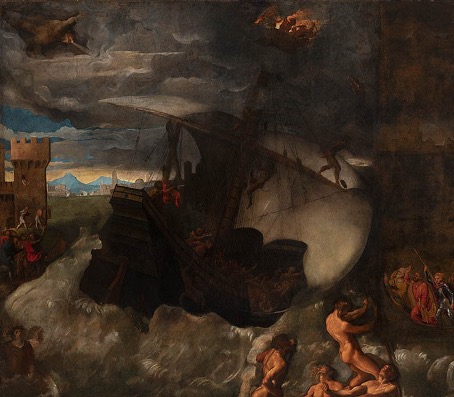In recent years, uncertainty brought by the COVID-19 pandemic, natural hazards caused by climate change, and the outbreak of wars worldwide have made people think more and more about the future. How can we overcome these crises? What plans can we make to build resilience against them? How can we avoid their occurrence in the time to come? People create and use future expectations to deal with risks and disasters threatening their everyday lives now, as they did in the past. In his dissertation, Nicolò Zennaro investigates how medieval people, specifically merchants, thought about their future and used their expectations to avoid, cope with, and overcome risks and dangers in late medieval Venice. To do so, he analysed the letters written by Florentine and Venetian merchants in 1400, a year defined as disastrous. (Text: Nicolò Zennaro)
A disastrous year
During 1400, the private lives and businesses of merchants living in Venice were simultaneously disrupted by several crises. Among these, three were considered as most threatening by the Venetian merchant community: a severe plague outbreak, a maritime storm, and war. The plague killed 16.000 people (out of approximately 80.000 inhabitants) in only a few months. The storm wrecked the Venetian convoys from the Levant, sinking one of the richest cargoes, expected in the Rialto market for that year. Finally, wars raged in Italy and the Middle East, causing a slowdown or complete shutdown of essential businesses for the city’s economy.
Creating the Future
In light of this critical period, the Florentine merchants Bindo Piaciti and Bartolo Zati, and the Venetian patrician and merchant Paris Soranzo had to try to forecast the possible outcomes of each mentioned crisis to plan their everyday lives and business. By doing so, these businessmen aimed to create an efficient reaction to these disruptions in order to suffer the least possible damage from them. In order to shape their future expectations, medieval merchants had to compare news they obtained from their partners and the rumours going around at the Rialto market with what they knew from their education as merchants, their personal culture, and experience. Zennaro could reconstruct these people’s individual mentality, not only through the letters written by the merchants, but also by studying sources revealing evidence of their culture and commercial practices (diaries, account books, merchant manuals, etc.).
Mercantile Prayers and Disasters
Another element highlighted by Zennaro’s research is the change in the relationship between medieval merchants and God in the face of disasters. Generally, letters provide us with empty formulae referring to God, used as greetings or stylistic elements in this type of document (e.g. “May God guard you”). When medieval merchants dealt with disasters, the overwhelming danger they perceived caused them to ask God’s help in a more direct way, through “mercantile prayers”. In these cases, God was no longer mentioned as a mere formulaic part of the letter, but He was seen as a protector of these merchants’ futures (e.g. “May God restore us and the other merchants, and may He save us from other similar dangers!”), with a strong level of agency.
Past Futures, Modern Futures
This dissertation shows how people’s responses to risks and disasters, in the past and today, are firmly based on their future attitudes. Without imagining possible effects of dangers or ways to prevent them from happening again in the future, we cannot develop resilience to them. Nicolò Zennaro has proven that studying medieval people’s attitudes towards the future can unveil unexpected aspects of how people in the past perceived and reacted to risk.
Contact
Nicolò Zennaro | nicolo.zennaro@uantwerpen.be
If you want to read more blog posts concerning this research, see: https://www.uantwerpen.be/en/projects/back-to-the-future/news/
* Picture: Figure 1 Jacopo Negretti detto Palma il Vecchio, Paris Bordon, Saints Mark, George, and Nicholas Free Venice from the Demons (Sea Storm). Source: www.gallerieaccademia.it


